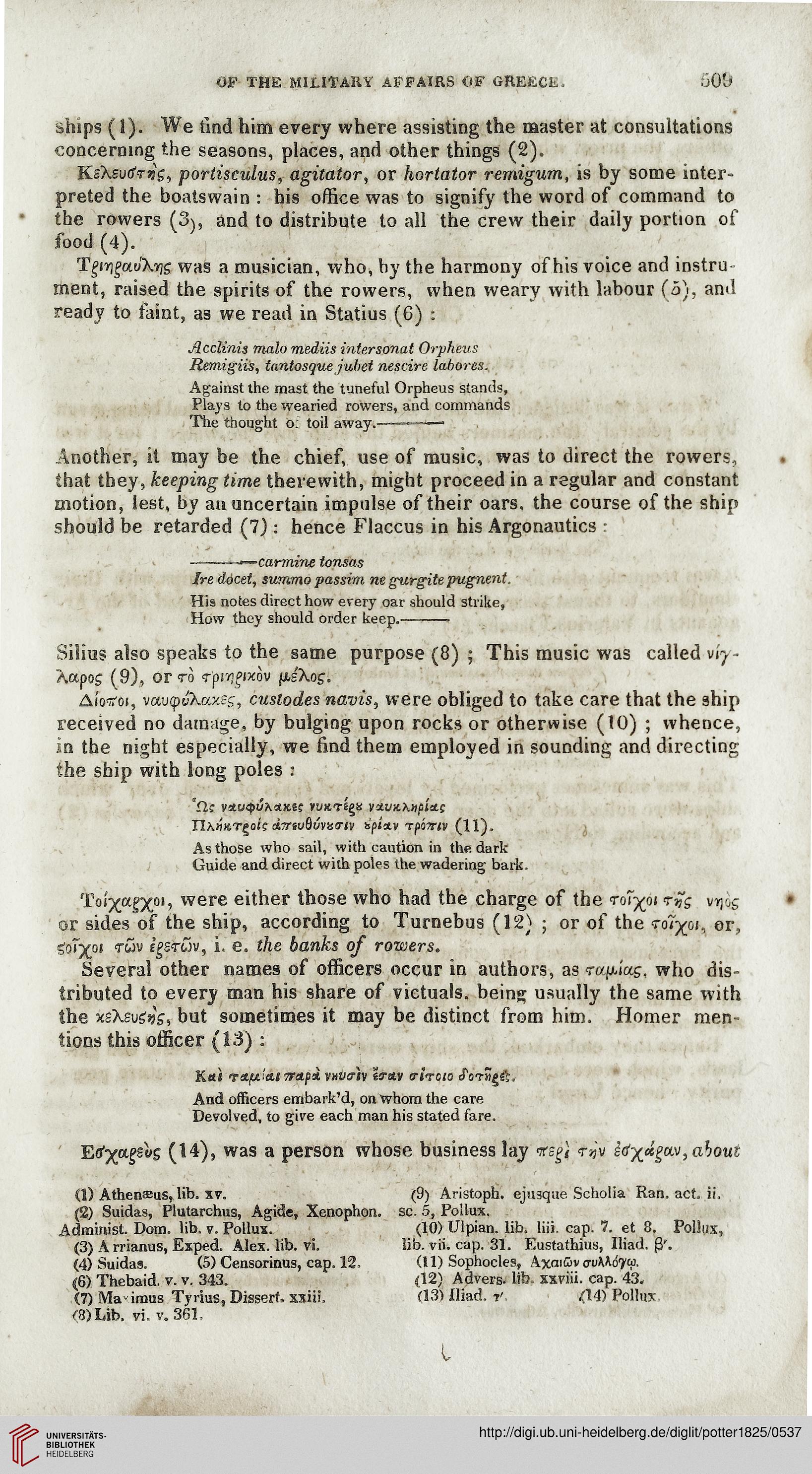OF THE MILITARY AFFAIRS OF GREECE, 60U
ships (1). We tind him every where assisting the master at consultations
concerning the seasons, places, and other things (2).
KsXsutfTflV, portisculus, agitator, or hortator rernigum, is by some inter-
preted the boatswain : his office was to signify the word of command to
the rowers (3), and to distribute to all the crew their daily portion of
food (4).
T^i^au'X'/)5 was a musician, who, by the harmony of his voice and instru
ment, raised the spirits of the rowers, when weary with labour (5), and
ready to faint, as we read in Statius (6) :
Acclinis malo mediis intersonat Orpheus
Remigiis, tantosque jubet nescire labores.
Against the mast the tuneful Orpheus stands,
Plays to the wearied rowers, and commands
The thought o. toil away.--■
Another, it may be the chief, use of music, was to direct the rowers,
that they, keeping time therewith, might proceed in a regular and constant
motion, lest, by an uncertain impulse of their oars, the course of the ship
should be retarded (7) : hence Flaccus in his Argonautics :
-carmine tonsas
Ire docet, summo passim ne gurgite pugnent.
His notes direct how every oar should strike,
How they should order keep.-
Silius also speaks to the same purpose (8) ; This music was called v(^-
Xotpog (9), or to fftygmfo nsXog.
AiWoi, vuvyvkaxsz, custodes navis, were obliged to take care that the ship
received no damage, by bulging upon rocks or otherwise (10) ; whence,
in the night especially, we find them employed in sounding and directing
the ship with long poles :
'CIS VZUQUKtKiS WKTie* V^VX.X>ipisL;
TlAWKTYjofc oS7rsu8t/va<r(v fc'piav -rpoTnv (11).
As those who sail, with caution in the. dark
Guide and direct with poles the wadering bark.
r£°'lXHX0,,> were either those who had the charge of the ror^oi rifg vrjog
or sides of the ship, according to Turnebus (12) ; or of the toT^oj, or,
s'ot'^oi twv cgsruv, i. e. the banks of rowers.
Several other names of officers occur in authors, as Tu^lag, who dis-
tributed to every man his share of victuals, being usually the same with
the xsXsu^V, but sometimes it may be distinct from him. Homer men-
tions this officer (13) :
Kai T«|«ia/ Tro.fi vitvirh erav u-iVe/o cTotmi»£.
And officers embark'd, on whom the care
Devolved, to give each man his stated fare.
Eo^agsus (^4), was a person whose business lay *s£< tjjv ityctgoM, about
(1) Athenffius, lib. xv. (9) Aristoph. ejusque Scholia Ran. act. ii.
(2) Suidas, Plutarchus, Agide, Xenophon. sc. 5, Pollux.
Administ. Dom. lib. v. Pollux. (10) Ulpian. lib. liii. cap. 7. et 8. Pollux,
(3) A rrianus, Exped. Alex. lib. vi. lib. vii. cap. 31. Eustathius, Iliad. (3\
(4) Suidas. (5) Censorinus, cap. 12, (11) Sophocles, AocniGv cvMyu.
(6) Thebaid. v. v. 343. (12) Advers. lib. xxviii. cap. 43.
(7) Ma-imus Tyrius, Dissert, xxiii. (13) Iliad, t', {14) Pollux
mhib. vi. v. 361,
ships (1). We tind him every where assisting the master at consultations
concerning the seasons, places, and other things (2).
KsXsutfTflV, portisculus, agitator, or hortator rernigum, is by some inter-
preted the boatswain : his office was to signify the word of command to
the rowers (3), and to distribute to all the crew their daily portion of
food (4).
T^i^au'X'/)5 was a musician, who, by the harmony of his voice and instru
ment, raised the spirits of the rowers, when weary with labour (5), and
ready to faint, as we read in Statius (6) :
Acclinis malo mediis intersonat Orpheus
Remigiis, tantosque jubet nescire labores.
Against the mast the tuneful Orpheus stands,
Plays to the wearied rowers, and commands
The thought o. toil away.--■
Another, it may be the chief, use of music, was to direct the rowers,
that they, keeping time therewith, might proceed in a regular and constant
motion, lest, by an uncertain impulse of their oars, the course of the ship
should be retarded (7) : hence Flaccus in his Argonautics :
-carmine tonsas
Ire docet, summo passim ne gurgite pugnent.
His notes direct how every oar should strike,
How they should order keep.-
Silius also speaks to the same purpose (8) ; This music was called v(^-
Xotpog (9), or to fftygmfo nsXog.
AiWoi, vuvyvkaxsz, custodes navis, were obliged to take care that the ship
received no damage, by bulging upon rocks or otherwise (10) ; whence,
in the night especially, we find them employed in sounding and directing
the ship with long poles :
'CIS VZUQUKtKiS WKTie* V^VX.X>ipisL;
TlAWKTYjofc oS7rsu8t/va<r(v fc'piav -rpoTnv (11).
As those who sail, with caution in the. dark
Guide and direct with poles the wadering bark.
r£°'lXHX0,,> were either those who had the charge of the ror^oi rifg vrjog
or sides of the ship, according to Turnebus (12) ; or of the toT^oj, or,
s'ot'^oi twv cgsruv, i. e. the banks of rowers.
Several other names of officers occur in authors, as Tu^lag, who dis-
tributed to every man his share of victuals, being usually the same with
the xsXsu^V, but sometimes it may be distinct from him. Homer men-
tions this officer (13) :
Kai T«|«ia/ Tro.fi vitvirh erav u-iVe/o cTotmi»£.
And officers embark'd, on whom the care
Devolved, to give each man his stated fare.
Eo^agsus (^4), was a person whose business lay *s£< tjjv ityctgoM, about
(1) Athenffius, lib. xv. (9) Aristoph. ejusque Scholia Ran. act. ii.
(2) Suidas, Plutarchus, Agide, Xenophon. sc. 5, Pollux.
Administ. Dom. lib. v. Pollux. (10) Ulpian. lib. liii. cap. 7. et 8. Pollux,
(3) A rrianus, Exped. Alex. lib. vi. lib. vii. cap. 31. Eustathius, Iliad. (3\
(4) Suidas. (5) Censorinus, cap. 12, (11) Sophocles, AocniGv cvMyu.
(6) Thebaid. v. v. 343. (12) Advers. lib. xxviii. cap. 43.
(7) Ma-imus Tyrius, Dissert, xxiii. (13) Iliad, t', {14) Pollux
mhib. vi. v. 361,




